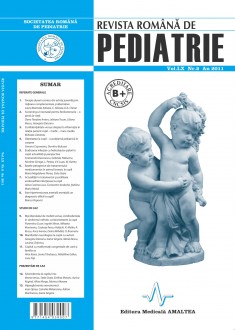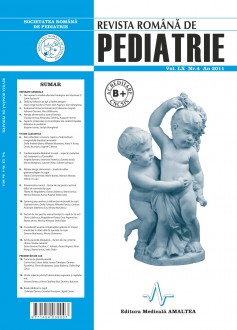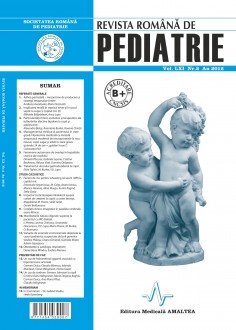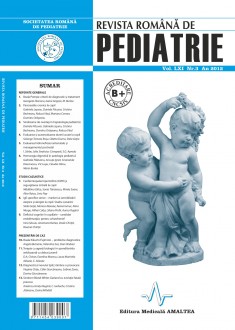SELECT ISSUE

Indexed

| |

|
|
|
| |
|
|
|

|
|
|
|
|
|
|
HIGHLIGHTS
National Awards “Science and Research”
NEW! RJP has announced the annually National Award for "Science and Research" for the best scientific articles published throughout the year in the official journal.
Read the Recommendations for the Conduct, Reporting, Editing, and Publication of Scholarly work in Medical Journals.
The published medical research literature is a global public good. Medical journal editors have a social responsibility to promote global health by publishing, whenever possible, research that furthers health worldwide.
Eradication of Helicobacter Pylori infection in children: current matters and perspectives
Smaranda Diaconescu, Gabriela Paduraru, Nicoleta Gimiga, L. Perţea, Valeriu V. Lupu and M. Burlea
ABSTRACT
The strategies used to treat Helicobacter pylori infection in children derives mostly from recommendations based on clear consents in adult patients. The triple therapy that associates proton pump inhibitors (PPI), clarithromycin and amoxicillin is used on a large extent all over the world; beside this, other associations came out based either on PPI or bismuth salts. Nowadays, new drugs were introduced in anti-bacterial schemes, alongside esomeprazole, pantoprazole or lansoprazole being azithromicine and fluoroquinolones (in older children). At the same time, second line therapies were suggested in order to treat relapse or bacterial reinfection and these are quadruple associations based on bismuth salts or regimens including fluoroquinolones; the introduction of sequential therapy in children also represents a promising alternative. Concerning prophylaxy, the oral or intramuscular vaccine (the latter being in an advance clinical trial), should be able to contribute in the future to decrease the incidence of H.pylori infection, gastritis, ulcer and gastric cancer.
Key words: H.pylori, quadruple schemes, fluoroquinolones, sequential therapy, vaccine



